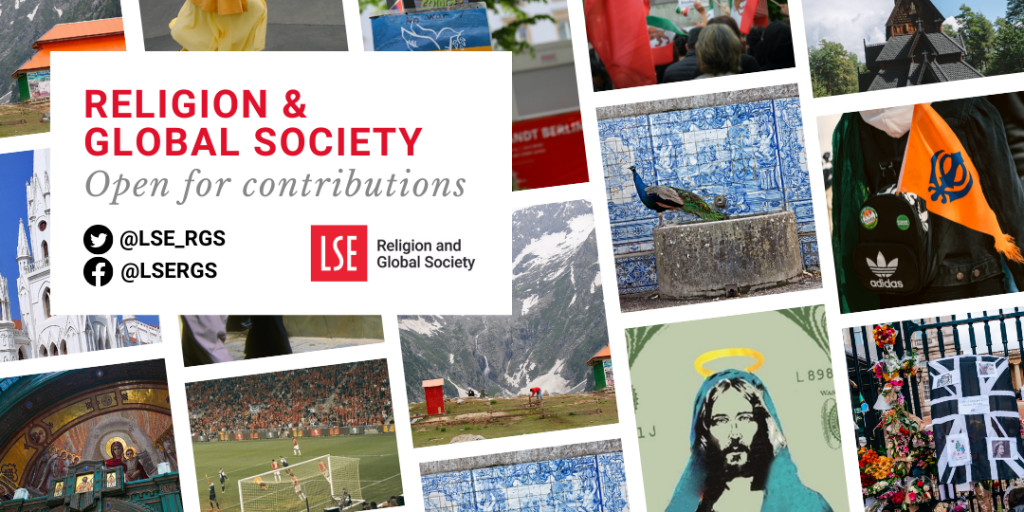
Our remit covers all aspects of religion and global society (including historical issues of contemporary relevance).
We primarily welcome submissions from researchers and research students and we aim for our articles to be between 800 and 1,200 words.
To contribute to the blog, please contact Flora Rustamova at f.d.rustamova@lse.ac.uk or tweet us @LSE_RGS. You can send a draft piece, a finished article, or just pitch us your ideas!
Please also send us a three-to-four line biographical note including your academic position, research interests and, if you wish, social media links and an author’s photo.
Current calls for contributions
Your pitch does not need to fall within one of the categories, but we are particularly interested in articles on the following topics:
- Cults, spirituality, and new religious movements
- Faith and Sport
- Empire, Religion and Legacy
- Environment and Religion
- Covenantal Pluralism
You can find a full list of articles and categories here.
Pitch us an idea
Send us a brief outline of the article you have in mind. This can be a title and some bullet points, or a fully formed abstract. If it sounds like something for us, we’ll give you some guidelines and a submission deadline.
Further guidelines
Articles should be written with a relatively wide audience in mind, including policy-makers and other non-academics. We recommend that you avoid overusing acronyms and specific terminology that may not be well known outside disciplinary circles. Our readers prefer when writers go straight into your discussion of the topic; as with journalistic pieces, lead with the best, don’t save your main argument or analysis for the end.
Have ‘Religion and Global Society’ in the back of your mind – even if your article focuses on a local case study, how might this be linked to a broader consideration of religion for an international readership?
If possible, convert numbered lists and bullet points into full paragraphs.
Write your article as a standalone piece, even if it summarises material in a longer paper or journal article. Try to present all of your argument and evidence within the text and avoid relying too heavily on information contained in external sources.
Use links rather than citations for references. Links should direct readers to more detailed reports or other pieces of research, news items or other blog posts. Open access sources are preferable to those behind paywalls. Please insert a hyperlink at the relevant point of your argument that you’d like to reference or simply put the URL in parentheses where you would like it to be placed and we will link it ourselves.
We may choose the article title and sub-titles ourselves to make sure they fit our format and presentation style, but your suggestions are welcome. We use narrative titles, i.e. a single sentence that sums up the main argument of the article. The more descriptive and catchy the title, the more likely the article is to be read.
If you have a preferred image or photo to accompany the article, let us know. Otherwise, we will choose one.
The managing editor will go over each post. If we have any questions and/or suggestions we will get back to you before publication, but we will not rewrite your piece. This is your voice and your signature. Once articles are published, we are happy to make further edits or clarifications.
If you do not wish for your article to be republished anywhere else, please let us know. Otherwise, we will assume you do not object.
Unless otherwise specified, all of our content is licensed under a Creative Commons license and other blogs and publications are free to use them, with attribution.
To find our Comments Policy, click here.
Republishing guidelines
If you’d like to republish one of our articles, please get in touch with our Editor Flora Rustamova at f.d.rustamova@lse.ac.uk.

